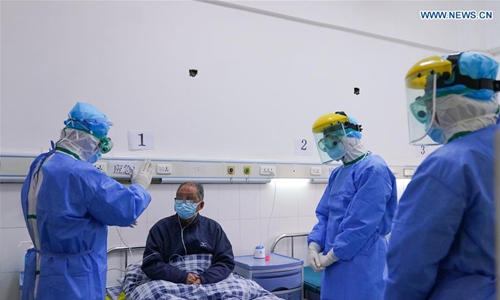HOME >> CHINA
Recovered COVID19 patients testing positive not equal to coronavirus revival: experts
By Wang Qi Source:Global Times Published: 2020/2/26 20:53:19

Doctors encourage a patient during making ward rounds in Zhangzhou Municipal Hospital in Zhangzhou, southeast China's Fujian Province, Feb. 2, 2020. Zhangzhou Municipal Hospital is a designated hospital to treat patients infected with the novel coronavirus in the city. It has started receiving patients with its emergency wards since Jan. 26 in a bid to fight against the virus outbreak. (Photo by Xiao Heyong/Xinhua)
Cases in which recovered patients of novel coronavirus pneumonia are tested positive in later check-ups do not mean the return of the coronavirus in their body, following media reports that 13 recovered patients in South China's Guangdong Province were tested positive again after being discharged from hospitals.
However, it's worth paying close attention, but there's no need to panic, experts said.
Guangdong health authorities said on Tuesday that 13 COVID-19 patients recovered and discharged from hospitals were tested positive again in later check-ups, and about 14 percent of recovered patients were test positive later.
The province has 844 patients recovered and discharged from hospitals as of Wednesday.
The health authority also said that none of the 13 people showed renewed symptoms, and the nucleic acid test results of 104 close contacts of these patients were found negative, which means they were not infected.
Some netizens doubt whether there's a need to recalibrate the criteria for defining what constitutes a recovered patient.
In an interview with Caixin, Cai Weiping, director of the Infectious Diseases Division of the No.8 People's Hospital in Guangzhou, disclosed the positive results were all found from anal samples, and the results were actually in the "weak positive" range.
Zeng Guang, chief epidemiologist of the China Center for Disease Control and Prevention in Beijing, told the Global Times on Wednesday that what caused the results of being tested positive is key to the problem.
If a live virus is found in feces of recovered patients, then nationwide vigilance is needed as it shows that the patients were not fully recovered and they may infect others, experts said.
Cai told Caixin that it is unknown whether it's the live virus or virus fragments that caused the positive results, and it's likely that the test results may be inaccurate considering the impurities in the feces samples.
Yang Zhanqiu, deputy director of the pathogen biology department at Wuhan University, believes that the treatment guideline for COVID-19 should be updated with times. However, he said it is reasonable not to include fecal testing in the test to decide whether a patient recovers and can be discharged.
The latest national treatment guideline says the recovery and discharging requires patients to pass the tests of lungs CT images, respiratory symptoms, body temperature, and two consecutive negative nucleic acid tests of respiratory specimens. Top health authorities also required recovered patients to quarantine at home for 14 days, and come to the hospital for check-ups on the second and fourth weeks after release.
"The tests are very sensitive that even a virus fragment could theoretically make the test positive," Yang said.
"But virus fragments on the feces also potentially indicate the coronavirus is still alive in the patient's body, or sample feces are polluted by fragments from somewhere else, especially when a patient shows no symptoms and the test takes place two weeks after discharge," said Yang.
Typically, there is no live virus in the patient's body about 10 days after being recognized as recovered, Yang said, also noting that the situation in Guangdong remains to be observed with caution.
Posted in: SOCIETY